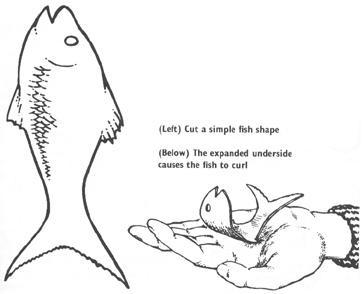Chapter: SCIENCE EXPERIMENTS & AMUSEMENTS FOR CHILDREN BY CHARLES VIVIAN. Simple Technical Steped Practical Projects for school and college students.
A Lively Celluloid Fish

A Lively Celluloid Fish
You will need: Scissors, celluloid or sheet
plastic.
Cut a simple fish shape
about 4 inches in length from a piece of celluloid or sheet plastic. Give your
fish a fairly large tail, as shown below.
Tell your friend about the
lifelike properties of this toy fish-how it will curl and wriggle hi a friendly
manner when placed in the palm of a warm hand.
Let your friend rub his
hands together for a moment or two, so that they are really warm. Get him to
extend one hand, palm uppermost, and place the fish in position. Within a few
seconds the fish will be curling its head and tail up to meet each other.
The reason for this display
of agility is the fact that the plastic does not become warm evenly. The
underside expands as it is warmed by the palm of your friend's hand, but the
cold upper surface remains the same. The expansion of the underside forces the
toy fish to curl quite vigorously.
Children learn best through doing
Before children can
understand a thing, they need experience: seeing, touching, hearing, tasting,
smelling; choosing, arranging, putting things together, taking things apart.
Experimenting with real things.
Old-time school teaching
used only words and the teachers thought children knew something if they could
repeat it. Now we know better. To reach practical understanding we do not need
to use many words with young children.
Children are
clever. They learn a lot, without being taught. The greatest skill - to be able
to talk, to communicate is learnt outside school. In the classroom it's the
children who need to talk the most. Unfortunately it is the teacher who does
most of the talking!
Related Topics